What do we offer in Ayurveda?
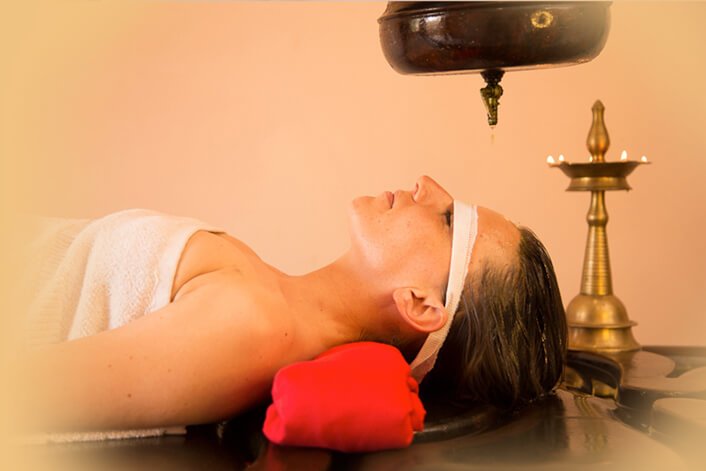
Ayurveda therapies
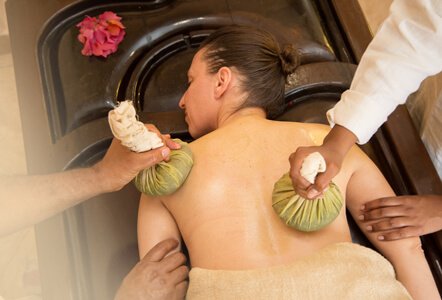
Panchakarma (Detox)
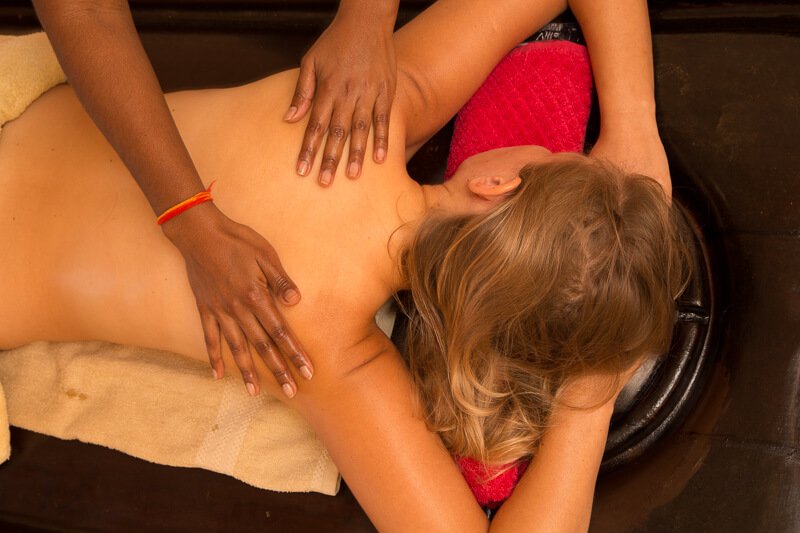
Courses
Holistic approach
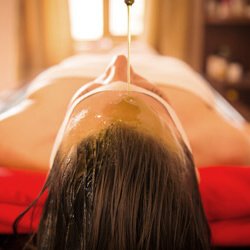
Ayurvedic therapies

Yogic & meditation practises
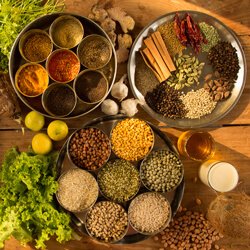
Healthy vegetarian diet

Accommodation

Consultation
All of ayurveda therapies

Kati vasti
Lower back healing
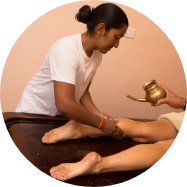
Pizchil
Whole body massage

Shiro vasti
Relaxation of mind

Greeva vasti
Neck healing

Swedanam
Steam bath
Commited to your health and well being
Holistic approach
Certified therapists
Fines natural products
Years of experience
About ayurveda
Ayurveda – the science of life
Ayurveda is the ancient Indian science of life. Much more than a system of medicines for ailments, it consists of a body of wisdom designed to help people stay healthy while living their life to its full potential.
Ayurvedic philosophy holds that the mind and the body are fundamentally connected, and that nothing has more power to heal than the mind. Ayurveda teaches us how to connect with and balance the life force within.
The essence of Ayurveda is a way of life, a holistic approach to health and well-being. It is an ancient system of rejuvenation of both the body and mind.
Ayurveda is considered to be the sister science of yoga, and as we are also a Yoga Centre, we are well-placed to provide you with an overall program for your overall health and well-being.
Disease is born when the mind is constantly in flux between the past and the future, causing stress, anxiety and depression. Ayurveda and yoga therapy help to bring the mind back to the present into a calm state, where healing can naturally occur.
The treatments that we offer are based on Ayurveda’s holistic views of the body, which covers lifestyle issues, diet, mental attitudes and a person’s individual constitution. According to Ayurveda, your constitution is determined by your body type, or dosha.
There are three types of doshas – vata, pitta and kapha, and it is the way in which they are combined in each individual that makes a person unique. Our trained therapists can help to analyse your body type and determine appropriate treatments according to this.
Want to know your own constitution? Read our next section on Self-diagnosis.
Self-diagnosis
Determining your body type In order to determine your body-type you first need to understand the doshas. The universe and all its components are made up of a combination of the five great elements, or five states of matter: earth, water, fire, air and space. The Tridosha, or three energies, are made up of these five elements, and are an indication of the constitution of each person’s body type. The table below shows the properties, functions and locations: vata, pitta and kapha. Every person is a combination of these three energies, with one being predominant. The purpose of this table is to create an awareness and understanding the Ayurveda point of view of one’s fundamental health.
Vata (air + space) Pitta (fire + water) Kapha (water + earth) Properties: dry, light, cold, rough, subtle, minute, moving Properties: slightly oily, light, hot, penetrating, unpleasant odour, spreading nature, liquid Properties: oily, heavy, cold, slow acting, slimy, firm, smooth Physical functions: motion, breathing, natural urges, speech, tissue transformation, senses, secretions and excretions, blood circulation, pulsation, nervous system. Physical functions: digestion, metabolism, hormones, enzymes, vision, hunger, thirst, colour complexion, temperature Physical functions: solid body structure, organ coating, lubrication, strength, potency Mental functions: fear, anxiety, impulses, pain, enthusiasm, alertness Mental functions: thinking, intelligence, understanding, perception, desire, courage, bravery, anger Mental functions: enthusiasm, forbearance, sexual urges, forgiveness, attachment, courage, passion, stability, greed Primary locations: intestines and lower body Primary locations: navel and stomach area Primary locations: chest, head and neck area (above the heart) Your inherent nature (prakriti) – You are unique! The Tridosha make up one’s constitution, or prakriti (inherent nature), which determines how to accept, process and absorb the food we eat, as well as how to respond to the environment around us. Each individual physical and mental body is determined by the relative proportions of the three doshas at the time of fertilization. When the embryo is formed, the constitution is determined. Unique constitutions mean that each person is different in their own way. This is why a diet programme can work well for some and not at all for others; why some people get ill during certain seasons while others do not; why some eat a little and gain weight while others eat a lot and do not gain any; why some get tired after little physical work whereas others seem to be endowed with an inexhaustible store of energy; and so on. According to Ayurveda there are seven main constitutions with one or more predominant doshas:
- Vata predominant
- Pitta predominant
- Kapha predominant
- Vata-pitta predominant
- Pitta-kapha predominant
- Kapha-vata predominant
- Vata-pitta-kapha in equal balance (a rare occurrence).
Understand your prakriti Below is a list of the physical and mental traits of each dosha.
TRAITS Vata Pitta Kapha PHYSICAL TRAITS Body frame/type Thin, lean Medium, athletic Large, stocky Hair Curly, dry, thick Straight, grey, bald Silky, thick, oily Eyes Small, unsteady Sharp, reddish Large, oval, clear Lips Thin, dry, cracked Pink, medium, soft Full, smooth Skin Thin, dry, rough, cold Smooth and warm Normal, cool Body Temperature Cold when touched Hot when touched Norma, cool Weight Lose easy, gain hard Steady, slow change Gain easy, lose hard Hunger Unpredictable Strong every 4 hours Regular Cravings Caffeine, sugar Spicy, intense foods Ice cream, cheese Digestion/elimination Regular constipation Rare constipation Slow, steady, regular Sleep Light, restless Sleep well 7-8 hours Deep, hard to wake Exercise Run, dance, move Competitive sports Mild, gentle Sweat Hard to sweat Sweat easily Regular Movement Quick, light step Average, strong step Slow, steady steps MENTAL TRAITS Temperament Lively, enthusiastic Motivated, intense Relaxed, accepting Learning Breadth over depth Analytical, in-depth Common topics Memory Quick grasp and loss Sharp, clear Slow grasp, not lost Work Independent/creative Leads, likes to be boss Employee, guided Projects Rarely completed Sets goals, executes Take time, completed Emotion under stress Anxiety, fear, worry Angry, irritable, jealous Laziness, withdrawal Decision-making Difficult, overthinking Quick, confident After contemplation Communication Fast talker Direct, persuasive Calm, deep voice Lifestyle Unattached, mobile Busy, well-structured Routine, constant Weather Dislikes cold, winter Dislike heat, humidity Dislikes cool, rain Faith and beliefs Ever changeable Strong, extremist Stable/set in stone Interest/motivation Art, travel, experience Sport, business, politics Comfort, family, food So, after having read this table
WHAT IS YOUR CONSTITUTION?
Testimonials
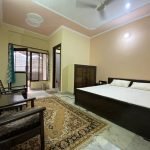
Barbara
Frankie Kao
Web DesignFrankie Kao
Web DesignOur doctors & therapists
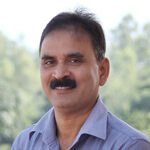
Ayurvedic therapies
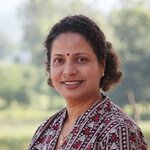
Ayurvedic therapies
Ayurveda consultant physicians
Prof. & Ayurveda Consultant BAMS, MD (Ay), PhD (Ayurvedic Medicine) IMS, BHU
Dr Ravindra Kumar Mamgain is one of the consultant doctors at the Vedic Yoga & Ayurveda Retreat Centre, and has 35 years of experience in the field of ayurveda which has led to his integrated and comprehensive approach to treating chronic diseases and lifestyle disorders. He has a wide knowledge of both conventional and ayurveda medicine.
Dr Ravindra was born and raised in northern India in the Garhwal region of the Himalayas, and was inspired from an early age by the great healing science of ayurveda. This led him to study ayurveda and gain his Masters Degree in Ayurveda Medicine & Surgery at Lucknow Ayurvedic College, and his PhD in Ayurvedic Medicine from the BHU Institute of Medical Science, Ayurveda Faculty.
He was a former medical consultant and Assistant Professor in the Ayurveda department of the Himalayan Institute Hospital, and currently runs his Mamgain Ayurveda Clinic from Rishikesh, India.
Prof. & Ayurveda consultant BAMS, MD (Ay), PhD (Ayurvedic Medicine) IMS, BHU
Dr Pratibha Mamgain is the wife of Dr R.K. Mamgain and is also one of the consultant doctors at the Vedic Yoga & Ayurveda Retreat Centre. She also has 35 years of experience in the field of ayurveda which has led to her integrated and comprehensive approach to treating chronic diseases and lifestyle disorders. She has been gifted with a natural healing ability and specialises in general health conditions.
Dr Pratibha was born and raised in a religious and spiritual family in the northern Indian region, in the state of Uttar Pradesh. She was inspired by the medical background of her family members to pursue ayurvedic medicine. She holds a Masters Degree in Ayurveda Medicine & Surgery from Lucknow Ayurvedic College, and a PhD in Ayurvedic Medicine from the BHU Institute of Medical Science, Ayurveda Faculty.
She has worked as a senior researcher in the field of ayurveda medicine and has served as a former resident and consultant doctor in Himalayan Institute Hospital. Later she became a consultant and lecturer at the Institute of Medicine, Tribhuvan University Kathmandu. She currently works with her husband Dr Ravindra at their Mamgain Ayurveda Clinic in Rishikesh, India.
Our team
Himalayan Tradition
Years of Mastery
Holistic approach
Certified therapist
Enter your email below
© 2025 Vedic Yoga Trust®. All rights reserved.